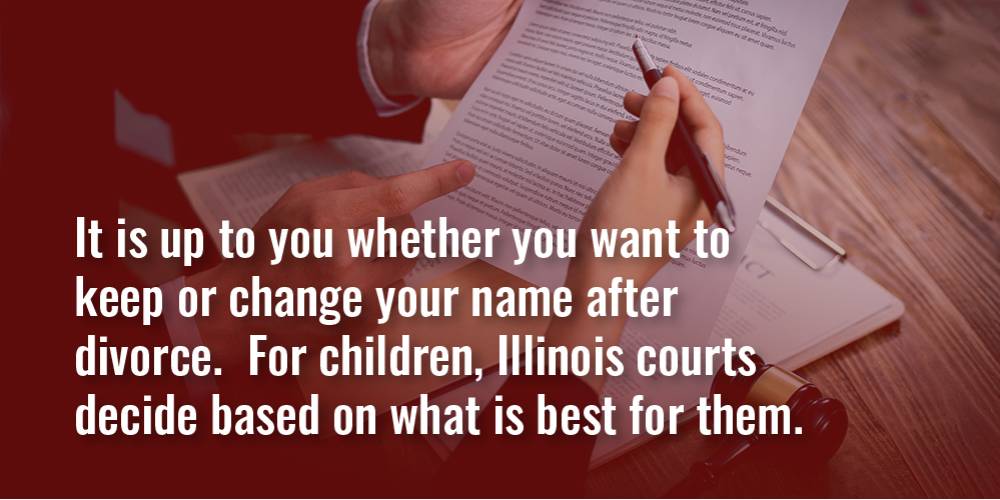 630-393-3111
630-393-3111
4200 Cantera Drive, Suite 200 | Warrenville, IL 60555
Can My Kids and I Keep My Married Name After Divorce?
 In Illinois, you can keep your married name after divorce, and your children’s last names will stay the same unless a court orders otherwise. Some parents choose to return to a maiden name, while others keep their married name so they share a last name with their children. If you have questions about this or any other aspect of ending your marriage, a Naperville, IL divorce lawyer can offer advice and service rooted in experience.
In Illinois, you can keep your married name after divorce, and your children’s last names will stay the same unless a court orders otherwise. Some parents choose to return to a maiden name, while others keep their married name so they share a last name with their children. If you have questions about this or any other aspect of ending your marriage, a Naperville, IL divorce lawyer can offer advice and service rooted in experience.
Why Do Some Parents Choose To Keep Their Married Name After Divorce?
The most common reason parents keep a married name after divorce is the desire to have the same last name as their children. Sharing a last name can reduce confusion in schools, medical settings, and community activities. It also helps children feel a sense of stability during a time of transition.
Some professionals may keep their married name for career reasons. If you have built a reputation or business under your married name, changing it could create unnecessary challenges. Others simply feel that their married name has become part of their identity, and giving it up is not the right choice for them.
Illinois law gives you the freedom to decide whether to restore your maiden name or continue using your married name after divorce. The choice is personal, but there is a legal process behind it.
What Does Illinois Law Say About Keeping Your Last Name After Divorce?
Under 750 ILCS 5/413(c), your divorce judgment will include a provision that lets you return to your former or maiden name if you prefer. If your judgment includes this, you do not need to file a separate name change petition under the Code of Civil Procedure. You can just continue to use your married name legally.
If you later decide to change your name, you may petition for a name change under 735 ILCS 5/21-101. This process typically involves filing a petition in the county where you live, publishing notice, and attending a hearing. In cases of domestic violence, the court may waive the publication requirement for safety reasons.
The decision to keep or change your name after divorce is separate from issues like custody or parenting time. Courts do not use your choice of name against you when allocating parental responsibilities.
How Do Illinois Courts Handle Requests To Change a Child’s Last Name?
Unlike a parent’s decision to keep or change their own name, changes to a child’s last name are subject to court approval. Illinois law prioritizes the best interests of the child. Under the Illinois Parentage Act of 2015, a parent who wishes to change a child’s last name must file a petition with the court.
When reviewing the request, judges consider several factors, including:
-
The wishes of both parents
-
The child’s wishes, if they are mature enough
-
The child’s relationship with each parent
-
The impact on the child’s social life, education, and community ties
-
Whether changing or keeping the name will promote stability
For example, if your child has grown up with one last name and is known by teachers, friends, and extended family under that name, the court may decide that keeping it is best for their emotional well-being. On the other hand, if the child primarily lives with you and has little relationship with their other parent, a judge may allow a change so their name matches yours.
What Happens When Parents Disagree About a Child’s Last Name in Illinois?
Disagreements between parents about a child’s last name are more common than you might expect. In these cases, the court has to step in to decide what should happen.
Illinois courts have made it clear that the best interests of the child standard is the guiding principle. In the case of In re Marriage of Presson, the Illinois Supreme Court held that the emotional and developmental needs of the child outweigh the preferences of either parent. The court also made it clear that a custodial parent does not have an automatic right to change a child’s surname. Instead, the parent asking for the change must prove that it is in the child’s best interests.
This means that a name change will not be granted just because one parent feels hurt by a divorce or wants the child to share their name. Judges look at how the change might affect the child’s identity, stability, and relationships with both parents.
If you and your co-parent cannot agree, the court will evaluate the evidence presented. This may include testimony from teachers, family members, or, depending on the child’s age and maturity, from the child directly.
Practical and Emotional Considerations for Changing a Last Name After Divorce
There is much more to changing a name than the legal concerns, especially for a child. Other elements to consider include:
-
A name change requires new identification documents. This includes updates to school and medical records, insurance policies, and bank accounts.
-
Children may need to explain the change to teachers, friends, or teammates. That might be stressful for them during an already difficult time.
-
Sharing the same last name as the parent they live with most often can help children feel grounded and stable.
-
Older children may connect their last name to their personal identity or cultural background. Considering their opinions on the subject is often important to them.
-
A change that makes one parent feel closer to the child may cause the other parent to feel excluded. Sometimes, forcing that change can cause unnecessary conflict.

Talk to a DuPage County, IL Family Law Attorney Today
Deciding whether to keep or change a name is just one small part of the larger divorce process in Illinois. Divorce also involves parenting responsibilities, financial matters, property division, and many other issues that can affect you and your child. Having an experienced guide by your side ensures that every detail, no matter how big or small, is carefully considered.
Attorney Michael J. Calabrese brings decades of experience to every case. As a former chair of the DuPage County Bar Association Family Law Committee, he has also lectured on family law issues, sharing his knowledge with colleagues throughout the legal community. Since 1994, he has successfully represented clients in divorce and family law matters, combining deep knowledge of Illinois law with a practical, client-focused approach.
Call our office today at 630-393-3111 to schedule a consultation with an experienced Naperville, IL divorce lawyer. At Calabrese Associates, P.C., we are here to help you understand every step of the divorce process.


 4200 Cantera Drive, Suite 200, Warrenville, IL 60555
4200 Cantera Drive, Suite 200, Warrenville, IL 60555 630-393-3111
630-393-3111





